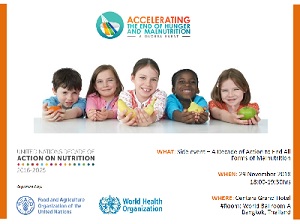Side event: A Decade of Action to end all forms of malnutrition
Scope and purpose
In 2017, 51 million of the world’s children under 5 years of age were wasted, 151 million were stunted and at the same time, 38 million children were overweight or obese. Still, today 821 million people suffer from hunger: this is one in nine people in the world. The developmental, economic, and social impacts of the global burden of malnutrition are serious and lasting, for individuals and their families, for communities and for countries. 
Our food systems are shaped by a variety of drivers and policies, and they are currently not providing to ensure healthy, affordable and sustainable diets for all. From food production to consumption and waste disposal, the different sectoral policies including agricultural, economic, trade, environment and international development create (dis)incentives for production of particular types of food. Food environments determine what foods will reach the consumer and be consumed.
In April 2016, the UN General Assembly, through its Resolution 70/259, endorsed the Second International Conference on Nutrition (ICN2) outcomes and proclaimed 2016 to 2025 the United Nations Decade of Action on Nutrition (Nutrition Decade). It seeks to support and catalyze nutrition actions and investments by helping countries attain specific, measurable, achievable, relevant and time-bound (SMART) commitments by 2025. By addressing all forms of malnutrition in all population groups, from stunting, wasting and micronutrient deficiencies to overweight, obesity and nutrition-related noncommunicable disease (NCD), actions under the Nutrition Decade will lead the world to meeting the World Health Assembly global nutrition targets and the global nutrition related NCD targets.
At the sidelines of the “Accelerating the End of hunger and Malnutrition Global Event”, WHO and FAO are co-organizing this side event on “A Decade of Action to End All Forms of Malnutrition”. There will be a World Café style discussion of nutrition actors dealing with very different aspects of ending the malnutrition burden.
Objectives of this event
- Provide opportunity to assess – two years into the Nutrition Decade – what the progress is of implementation of nutrition commitments by governments, the UN and other actors to address the double burden of malnutrition.
- FAO and WHO will report on the progress made in different policy domains, including health, food, and social protection systems; and on the accountability mechanisms that have been established.
- Launching of the FAO/WHO resource guide for making commitments “Strengthening Nutrition Action”.
- Discussion with panel members and audience: Different forms of malnutrition: what’s the common ground for action? Identification of opportunities for collaboration in the six different action areas of the Decade of Action on Nutrition. Can better food systems address all forms of malnutrition?
Invited speakers
Opening Remarks
Kostas Stamoulis – Assistant Director-General of the Economic and Social Development Department at the Food and Agriculture Organization
What’s the state of affairs 2 years into the Decade of Action on Nutrition?
Francesco Branca – Director of Department of Nutrition for Health and Development, World Health Organization
World Café moderator
Gerda Verburg – Scaling Up Nutrition Movement (SUN) Global Coordinator
- Mesfin Teklu Tessema – Senior Director of Health, International Rescuer Committee
- Nabeeha Kazi – Executive Director, No Wasted Lives
- Corinna Hawkes – Professor of Food Policy, Director, Centre for food Policy, City University of London (TBC)
- Senator Guido Girardi – Chile
- Howdy Bouis – Director, Harvest Plus
- Biplabi Shrestha – CFS Civil Society Mechanism representative
Closing Remarks
Mario Arvelo – Chari of the Committee on World Food Security
